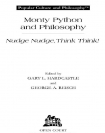Monty Python and Philosophy, Gary Hardcastle [portable ebook reader TXT] 📗

- Author: Gary Hardcastle
Book online «Monty Python and Philosophy, Gary Hardcastle [portable ebook reader TXT] 📗». Author Gary Hardcastle
Taking us from God to madness, Michelle Spinelli makes use of “The Idiot in Society” (Episode 20 of Monty Python’s Flying Circus, “The Attila the Hun Show”), among other classic Python skits, to get a grip on the claim, articulated by the social historian and philosopher Michel Foucault (1926-1984), that what counts as madness or insanity is something created—‘constructed’ is the word—by the society in question. Don’t be surprised if, after reading Spinelli’s “Madness in Monty Python’s Flying Circus,” you find yourself watching Monty Python’s Flying Circus, Foucault in hand.
Moving the focus from theology to morality, Patrick Croskery’s “Monty Python and the Search for the Meaning of Life” performs the remarkable feat of illustrating several notions of the ethical life, as well as its pitfalls, solely by way of Monty Python. Not unlike other authors, Croskery addresses the Pythonic flirtation with nihilism, the denial of values of any sort, and offers a sensible verdict: the Pythons know nihilism well, but they are not nihilists. Nihilism is also the starting point for Edward Slowik’s “Existentialism in Monty Python: Kafka, Camus, Nietzsche, and Sartre” (winner of the award for Most Names In A Single Title In This Volume. Congratulations, Ed). For Slowik, though, the Pythons’s message is more existentialist and less nihilist. He notes a particular resonance between Monty Python’s impatience with pretension and the philosophical message about life’s meaning offered by the German philosopher and redoubtable laugh-meister Friedrich Nietzsche (1844-1900).
The ghost of Wittgenstein looms large in Monty Python and in Rosalind Carey’s delightfully Gumbyish “My Brain Hurts!” Carey takes on the difficult question of what philosophy is exactly, a question that Wittgenstein himself answered in different ways throughout his life. Ludwig, sadly, could not avail himself of the Pythons to illustrate his ideas. But Carey has nicely filled the gap, matching bits of Python to bits of Wittgenstein in a manner that might not have pleased Wittgenstein himself (not much pleased him, to be honest) but, we think, enlightens and entertains us. Finally, anyone who has waded in philosophy’s waters will have noted the far-fetched, perplexing, and often downright silly “thought-experiments” that brighten philosophers’ eyes. In “Why Is a Philosopher Like a Python? How Philosophical Examples Work,” James Taylor faces head-on and explains this distinctly philosophical thing called the thought experiment. By comparing such experiments to sketches that are equally far-fetched and sometimes utterly absurd (but, we grant, much more entertaining), he shows that the philosophical thought experiment is not quite as crazy as it may first appear.
Bloody Hell, There’s More!?!
It depends how you look at it. Wittgenstein wrote that the same figure can be seen as a duck or a rabbit. So, you may see the remaining chapters as a misfit bunch of leftovers or, very differently, as a natural class defined by similarities of form and content. We see them as a school of ducks, each of which looks at philosophy (or some aspect of it) in light of the phenomenon of Monty Python. It is remarkable, after all, not only that the utterly bizarre Monty Python’s Flying Circus was sponsored by the BBC in the first place, but that Monty Python itself grew into an institution of enormous cultural influence. In light of that success and the many connections between philosophy and Monty Python explored in the earlier chapters, this section asks, What might be gleaned about the fortunes—or misfortunes—of the otherwise unworldly enterprise of philosophy? These authors (your two editors among them) think there is much to explore. Hence, our final section: Pythonic Aspects of Philosophy.
Alan Richardson’s “Tractatus Comedio-Philosophicus” wants us to know that the only difference between Monty Python and academic philosophy is that philosophy isn’t funny. Sensing philosophy’s imminent disaster, Richardson conducts an intervention (of sorts) to which he has invited Wittgenstein and Nietzsche, if you can picture that. George Reisch’s “Monty Python’s Utterly Devastating Critique of Ordinary Language Philosophy” makes the case that the Pythons imbibed, and found unsatisfying, far more of the analytic philosophy afoot in Cambridge and Oxford than might have otherwise been thought. Reisch then calls for a Python-inspired rehabilitation of philosophy, but one quite different from Richardson’s.
Yet a third style of rehabilitation is suggested—okay, demanded—by Bruce Baldwin’s “Word and Objection: How Monty Python Destroyed Modern Philosophy.” Though less sympathetic to the intersection of philosophy with popular culture than the other chapters, we chose to include Baldwin’s chapter (in the form of a faithfully transcribed lecture) in order to promote debate about philosophy in popular culture and because Baldwin’s personal investment in things Pythonic proved too ironic for us to resist.
Finally, Gary Hardcastle’s “My Years With Monty Python” recounts his adventures over the past ten years lecturing about Monty Python and philosophy to non-academic audiences. Hardcastle tries to make sense of why anyone would find the combination palatable, let alone entertaining. Taking up a similar question that Hume, that almost-seventh Python, posed centuries ago, Hardcastle finds a satisfying answer (note, however, that he is easily pleased). Hardcastle’s chapter makes frequent reference to his earlier essay, “Themes in Contemporary Analytic Philosophy as Reflected in the Work of Monty





Comments (0)